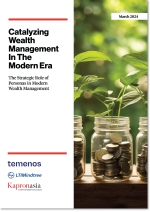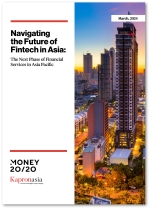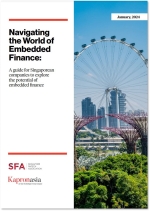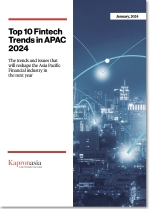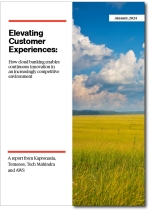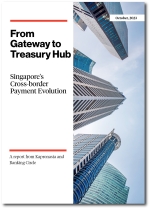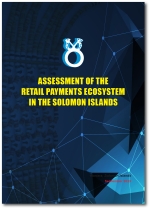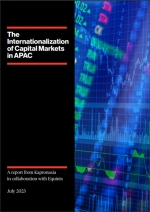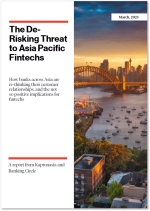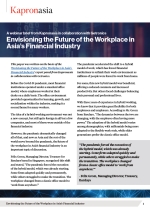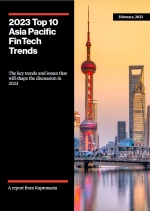Financial Industry Research Reports
Innovate to Elevate
Published: Mar 2024In the dynamic and diverse financial landscape of the Asia-Pacific (APAC) region, banks are at a pivotal juncture, facing the twin imperatives of innovation and resilience to meet evolving consumer expectations and navigate digital disruption.
Catalyzing Wealth Management In The Modern Era
Published: Mar 2024Hyper-personalized wealth management presents a paradigm shift from traditional models relying on static, generalized segments. Developing tailored investor personas based on psychographics, behaviours and fluid financial goals enables financial institutions to deliver rich and tailored customer experiences that resonate with next-generation priorities.
Navigating the Future of Fintech in Asia
Published: Mar 2024Although fintech has been a global phenomenon, nowhere has the combination of finance and technology been as impactful as in Asia. This report examines some of the key fintech trends that have been re-shaping Asia’s financial industry thusfar as well as examine the trends that will shape the future.
The Transformation of Retail Payments in Asia
Published: Jan 2024From the sprawling street markets of Bangkok to the high-tech shopping districts of Tokyo, the nature of retail payments is changing. Across Asia Pacific, a silent revolution is reshaping how consumers transact.
Navigating the World of Embedded Finance: A guide for Singaporean companies to explore the potential of embedded finance
Published: Jan 2024In today's increasingly digital economy, the concept of embedded finance has emerged as a powerful tool for non-financial companies to enhance their offerings and tap into new revenue streams.
Top 10 Fintech Trends in APAC 2024
Published: Jan 2024From financial inclusion to AI Fintech literacy, this report promises to be a highly valuable resource for staying ahead in the ever-evolving Fintech space, covering trends, issues, and challenges that will define 2024.
Elevating Customer Experiences: How cloud banking enables continuous innovation in an increasingly competitive environment
Published: Dec 2023The banking industry is experiencing a rapid evolution in consumer preferences and technology, which has brought it to a turning point. Read this report to gain insights into the strategic role of cloud banking in enabling continuous innovation amidst growing competition.
From Cash to QR Codes - Unpacking Southeast Asia's Diverse Consumer Payments Culture
Published: Nov 2023As a wave of digitisation swept over the consumer payment landscape in Southeast Asia, the pace of evolution has been so rapid that most of the payment data and coverage of fintech service providers from just two years ago is no longer valid.
From Gateway to Treasury Hub: Singapore's Cross-border Payment Evolution
Published: Nov 2023In the rapidly evolving landscape of global finance, few nations have witnessed a transformation as profound as that of the city-state of Singapore. What was once a regional trading post has become a formidable player in the world of cross-border payments and treasury management.
Assessment of the Retail Payments Ecosystem in the Solomon Islands
Published: Oct 2023The Solomon Islands has an opportunity to leverage ongoing payment modernization efforts, including the Automated Transfer System infrastructure, to help drive innovation in retail payments, increase the uptake of digital financial services, and promote financial inclusion.
The Internationalization of Capital Markets in APAC - A Report from Kapronasia in Collaboration with Equinix
Published: Jul 2023The internationalization of capital markets has accelerated over the last few years as ecosystem players such as exchanges and broker-dealers evolve from having a solely domestic presence, to having a more regional and global presence. There are several drivers behind this acceleration, which can be best broken down into demand factors, supply factors, and enablers.
The De-Risking Threat to Asia Pacific Fintechs - A Report from Kapronasia in Collaboration with Banking Circle
Published: Mar 2023In recent years, banks in the Asia-Pacific (APAC) region have faced rising regulatory scrutiny amid a global fight against money laundering and other financial crime. Banks have been rocked by the massive 1MDB scandal, implicated in the FinCEN papers and are wary of being exposed to the cryptocurrency industry, which is in its nascent stages and lacks comprehensive regulation.
Envisioning the Future of the Workplace in Asia’s Financial Industry - A Webinar Brief from Kapronasia in Collaboration with Getronics
Published: Feb 2023The pandemic forced financial institutions across the region to re-think the work environment. For many staff, this was a benefit as it shortened commutes and often improved productivity. For others, it was more challenging as it meant juggling personal and professional commitments.
2023 Top 10 Asia Pacific FinTech Trends
Published: Feb 2023As we start 2023, the global market faces a period of great geopolitical and macroeconomic uncertainty. Although there are signs that inflation might be under control and Europe has largely weathered the winter unscathed, many economists see more turbulent times ahead.
Readiness of Legacy Systems for Open Banking in Asia Pacific: A research brief from Kapronasia in collaboration with EPAM
Published: Jan 2023Open Banking arose out of a sweeping piece of European Union (EU) legislation known as the second Payment Services Directive, or PSD2, in 2016. It is the use of application programming interfaces (APIs) to streamline the sharing of customer bank data with third parties.


